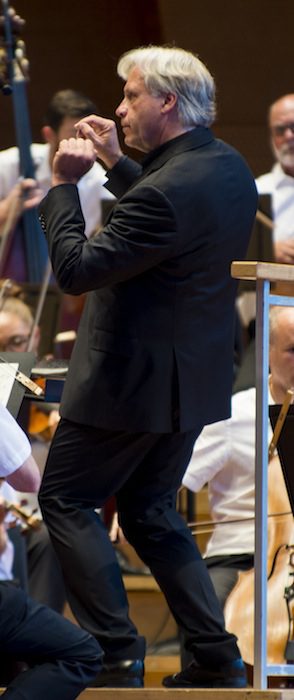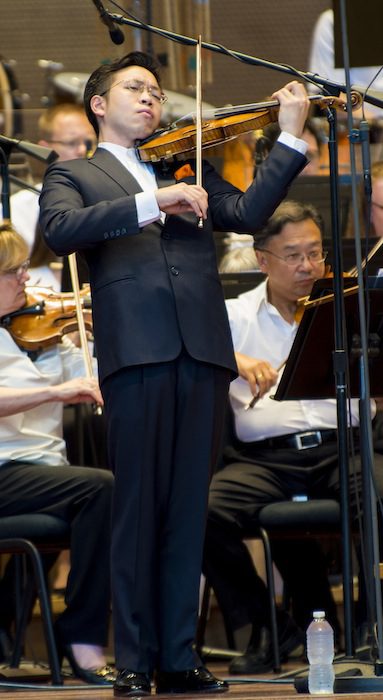Conductor Stenz makes auspicious Grant Park debut on a rainy night

The weather gods may not have cooperated for half of Friday night’s concert at the Pritzker Pavilion. But dampness and accompanying distractions apart, the evening’s program offered two impressive Grant Park Music Festival debuts.
Markus Stenz has not been heard in Chicago since 2009 when he conducted both the CSO and Lyric Opera’s production of Katya Kabanova. The German conductor currently enjoys a busy international career with an array of far-flung posts as principal conductor of the Netherlands Radio Philharmonic, principal guest conductor of the Baltimore Symphony Orchestra and conductor-in-residence of the Seoul Philharmonic.
Intermittent rain bedeviled the first part of the evening, with umbrellas up and down and patrons noisily scurrying to find dry seats underneath Frank Gehry’s billowing (and leaky) steel sails. Yet Stenz and the Grant Park Orchestra maintained admirable concentration and focus on the performances throughout.
Friday’s program was a typically diverting one, framing a 20th century concerto with an early romantic symphony and a significant contemporary work.
Detlev Glanert’s Frenesia led off the evening, and was heard in its Chicago premiere. Written in 2013, Frenesia (Frenzy) was sort-of inspired by Richard Strauss’s Ein Heldenleben, though more in style than heroic spirit. Indeed, the German composer says this work can be considered more apposite to the “Romantic view of grand heroism” than embodying it.
Though more of an “anti-Heldenleben,” Frenesia opens in a similar vein of striding, big-boned confidence though the style is punchier and darker. As with his Theatrum beastiarum, performed by the CSO under Semyon Bychkov in 2010, Glanert writes for large orchestral forces with power and audacity. This is symphonic heavy metal–dark, driving and intense yet undeniably exhilarating in its churning, aggressive edge.
The agitated energy stops abruptly for a few plaintive notes from a solo flute, leading to a more impressionistic section with woodwinds prominent. The music returns to its roiling dynamism before a surprising, gleaming major chord, and a winding down to a gloomy, decidedly unheroic throwaway coda.
Stenz led a powerful, surging performance with brilliant playing from the musicians across all sections that put across the sonic fury of Glanert’s writing. Stenz also drew a wide dynamic range, the hushed pianissimos registering clearly on an unusually quiet downtown evening.
The contrast could hardly have been greater with the ensuing work, Samuel Barber’s Violin Concerto, which brought the night’s second inspiring debut from soloist Paul Huang.
Winner of the 2015 Avery Fisher Career Grant, the young violinist was fully in synch with Barber’s vein of bittersweet nostalgia from his very first notes. Playing the 1742 ex-Wieniawski Guarneri del Gesu–on loan from the Stradivari Society of Chicago–Huang caressed the lyrical lines with a pure, luminous tune ideally suited to this score. Introduced by a lovely oboe rendering of the Andante’s main theme, Huang brought both spacious phrasing and fresh intimacy to this introspective music.
The only slight letdown was in the finale where Huang’s rather cautious style lacked virtuosic sizzle in the moto perpetuo fireworks, though he finished with a burst of adrenaline in the closing bars. Stenz and the orchestra were simpatico partners, the conductor alertly supporting the soloist and pointing lyric climaxes with fervor.
The sun come out belatedly for the closing work, Robert Schumann’s Symphony No. 1.
Though the season doesn’t quite align, with its rustic flavor and prevailing good cheer, Schumann’s “Spring” symphony is such a natural for al fresco concerts, it’s surprising the work doesn’t turn up more often on summer programs.
Here too, Stenz led an incisive, highly focused performance, wonderfully spirited in the outer movements. Perhaps a less brisk tempo in the Larghetto might have allowed more room for the romantic idyll to bloom more effectively.
That quibble apart, Stenz was consistently on top of Schumann’s balancing and tempo challenges. Apart from some wayward horn moments, the Grant Park musicians were clearly responsive to their conductor and delivered a polished and engaging performance.
The program will be repeated 7:30 p.m. Saturday at the Pritzker Pavilion. gpmf.org
Posted in Performances





